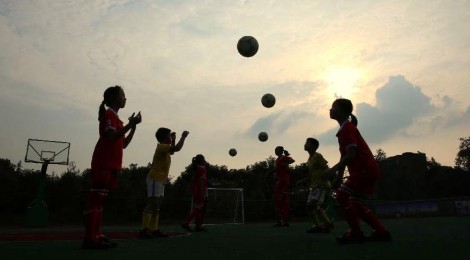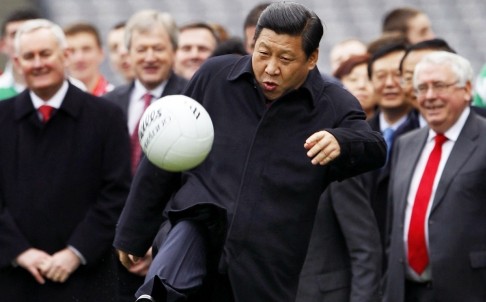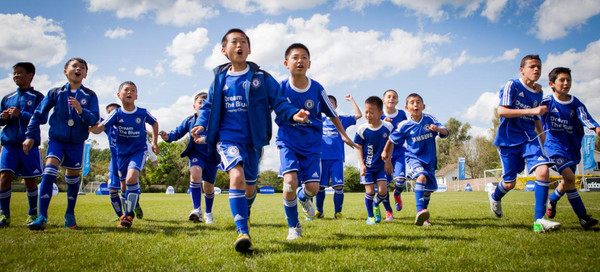
How to become a world football superpower: China’s recipe
China, with the world’s largest population, excels in many sports, especially athletics. Yet, it miserably underperformed at one of the most popular sport worldwide, and has made it into qualifying for the football World Cup only once before 2016. In fact, for the first time since 2001, the national men’s football team has qualified for the final round of Asian teams, seeking to advance onto the football’s biggest stage. At least, the Chinese women’s team has performed much better, making it to the quarterfinals in the 2015, 2007, and 2003 World Cups and all the way to the finals in 1999. China’s men’s football team is currently ranked 83rd by the International Football Federation.
Alongside Iran, South Korea, Uzbekistan, Syria and Qatar, China has been drawn in Group A of the third round qualifiers. Despite avoiding the strong sides of Japan and Australia – drawn in Group B – the Chinese team will need to do its best with Iran and South Korean, which pose considerable tests to the first group’s teams.
 On Monday, the National Development and Reform Commission of China has unveiled an ambitious blueprint to give the country one of the world’s leading national teams and becoming a “world football superpower” by 2050. The plan is already underway and implies the establishment of 20,000 football training centres in schools, with 30 million children playing the game regularly by the end of the decade. According to the scheme outlined in the 14 page-document, every county will have two full-size football fields, and every new urban residential compound at least one five-a-side court; it aims at transforming the men’s and women’s national teams into Asia’s best over the course of the coming 15 years.
On Monday, the National Development and Reform Commission of China has unveiled an ambitious blueprint to give the country one of the world’s leading national teams and becoming a “world football superpower” by 2050. The plan is already underway and implies the establishment of 20,000 football training centres in schools, with 30 million children playing the game regularly by the end of the decade. According to the scheme outlined in the 14 page-document, every county will have two full-size football fields, and every new urban residential compound at least one five-a-side court; it aims at transforming the men’s and women’s national teams into Asia’s best over the course of the coming 15 years.
But it is not just about sport. Like the Olympics, the World Cup has become a way to evaluate China’s prestige on the world stage. Welcoming the plan, Wang Dazhao, a Beijing-based sports commentator, said he believes the sport’s development will “transcend the playing fields. Football, as the world’s most popular sport, can drive huge economic growth and mass social participation in China. Its development will also boost the country’s cultural soft power.” This turns the World Cup into not just an athletic goal, but a political one as well.
An editorial of the China Daily agrees that China’s “football performances have been sadly lacking on the international stage,” highlighting that corruption, including match fixing and bribery, has undermined the game for a long time. President Xi Jinping, himself a football fan, has taken a personal interest in boosting China’s football prowess, so that the strategic position of football was laid out at the national level through the new plan. In 2011, he even announced his three wishes: China to qualify for another World Cup, to host a World Cup and finally, win a World Cup. The Xinhua news agency also points out that the plan is “part of the comprehensive deep reform of the Chinese society”.
 The new attention drawn by the central leadership has spurred unprecedented investments in the Chinese Super League, which spent a net €266 million to attract foreign talents just last winter – more than Europe’s top five leagues combined. Playing a role in this trend are the Chinese billionaires willing to appear supportive of the government’s policy, who are therefore pouring money into teams around the country. The most expensive deal saw Brazilian striker Alex Teixeira head to Jiangsu Suning for €50 million in transfer fees.
The new attention drawn by the central leadership has spurred unprecedented investments in the Chinese Super League, which spent a net €266 million to attract foreign talents just last winter – more than Europe’s top five leagues combined. Playing a role in this trend are the Chinese billionaires willing to appear supportive of the government’s policy, who are therefore pouring money into teams around the country. The most expensive deal saw Brazilian striker Alex Teixeira head to Jiangsu Suning for €50 million in transfer fees.
Despite all this clamour, scepticism about the success of the “China’s football dream” lingers. Ma Dexing, one of China’s most popular football writers, is not convinced the government’s plan will work. “It’s not realistic,” Ma said, “If you look at South Korea and Japan, they have developed using plans that were made by football people. In China, it is done by politicians and officials who don’t know anything about the game. There is lots of talk but no action.”
On 1 September China will get a first chance to test itself against South Korea, with whom has won just once in 29 meetings. Yet, Chinese fans would be glad to hear that the Korean coach, Uli Stielike, said it is not inevitable that China would become a continental powerhouse. Good luck everybody!




